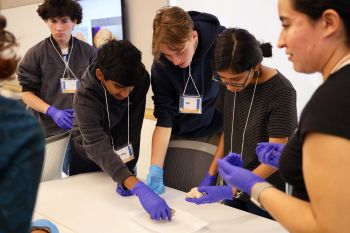By Emma Armstrong-Carter, PhD, Assistant Professor at Tufts University in the Eliot-Pearson School of Child Study and Human Development
Adolescence is a key developmental period when youth can learn to contribute to the lives of others in meaningful ways. Our ability to consider the needs, concerns, and perspectives of others increases throughout our teenage years. We become better able to provide emotional and practical support to our friends, family, schools, and broader communities in deeper, more impactful ways than when we were younger.
Contributing to others has been shown to support positive development for youth, helping to cultivate meaning and purpose, enhancing autonomy and agency, and promoting positive identity development. And families are typically the first context where youth have the opportunity to contribute to others, through common household chores such as cooking or taking care of animals.
But many middle and high school students are doing more than a few household chores. In an article for the Hechinger report, developmental psychologist Emma Armstrong-Carter highlights a form of contributing that many youth provide for their families, in addition to completing chores around the house—caregiving.
“Caregiving youth are young people below age 18 who provide ongoing, time-intensive care at home to family members who have aging-related needs or are chronically ill, such as grandparents, parents, and disabled siblings,” Emma explains.
While caregiving can have benefits for youth (young people can gain self-confidence, resilience, and close relationships), being responsible for someone’s physical or mental well-being can also be taxing in ways that negatively impact mental health and academic achievement. The experience of providing care can be stressful for youth as they are trying to go to school, develop friendships, or participate in afterschool activities, while also caregiving for their loved one by doing tasks such as administering medicine, washing, feeding, or helping with other activities of daily living. Because the responsibilities can be taxing, caregiving adolescents often report missing class, struggling to study and complete homework and feeling worried, fatigued, and isolated.
Caregiving youth need support from adults to ensure they meet their key developmental needs, and the first step is to identify caregiving youth. “Currently, caregiving students are ‘hidden’ from educational systems in the U.S. because they are not formally counted or supported,” Emma explains.
One way to identify caregiving students is by including a survey item in the mandated statewide, school-based behavioral studies which are already conducted in public schools in the U.S. As an example, Emma partnered with the Rhode Island Department of Education to survey 48,500 public middle and high school students across the state about their experiences providing care to their families. The survey helped bring national attention to caregiving youth, and revealed that 29 percent of middle and high school students reported caring for family part of the day, and 7 percent said they were doing so most of the day.
Once schools have identified caregiving adolescents, they can find ways to help youth feel less likely to have to choose between caregiving and school activities. For example, after recognizing that one in three students in Rhode Island take care of a family member for part or most of the day, the Rhode Island Department of Education is beginning to develop solutions for supporting caregiving youth in schools across the state. Currently, the department requires every public middle and high school in the state to develop flexibility and supports for caregiving students.
Together, Emma Armstrong-Carter and the Rhode Island Department of Education suggest five ways that schools can provide additional support for caregiving youth:
- Offer flexible course schedules.
- Explore the idea of awarding students with community service hours for their caregiving work.
- Train teachers and social workers to understand caregiving youth and their experiences.
- Embrace and celebrate diversity (in identity or family structure, for example), and recognize that not every young person’s experience is the same.
- Create and facilitate support and skill-building groups for caregiving youth to ensure they feel less alone.
Although contributing can be good for youth, too much responsibility for others can interfere with young caregivers’ health and wellbeing. Adults must ensure that all youth are able to meet their key developmental needs. By having targeted support systems in place, adults can promote positive development for all students, including caregiving youth, so they have what they need to thrive.



_350_233_80_c1.jpg)